
Today we talk about the concept of denaturalization citizenship. It is a formal legal procedure through which the U.S. government denaturalizes one having U.S. nationality. Many find the loss of or the denaturalization of citizenship to be a drastic and extreme action in immigration law.
The government very rarely exercises its power to carry out the denaturalization of US citizenship. However, even with decades passing after the initial award, a denaturalization order remains a necessary legal safeguard of the security and fairness of the judicial system. With shifting enforcement priorities regarding immigration, understanding the denaturalization process is important.
What Is Denaturalization Citizenship?
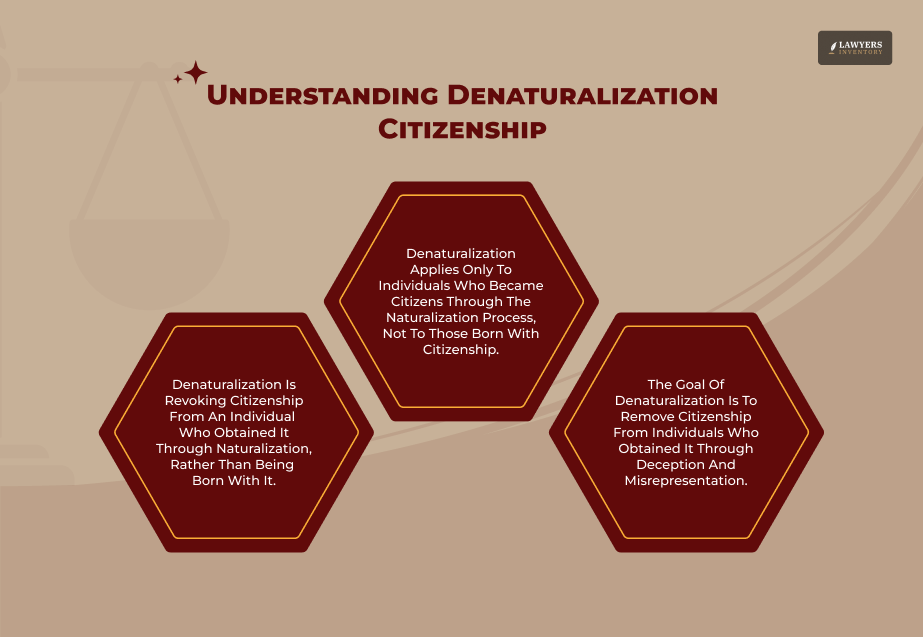
Before we go into the details of denaturalization citizenship, let us break things down for you. Firstly, what does a naturalized or derived citizen mean?
What is Denaturalization Citizenship?
Well, now that we are familiar with what naturalization is, let’s know more. Denaturalization citizenship is the formal revocation of citizenship.
Denaturalization is the revocation and cancellation of the court’s judgment admitting an individual to citizenship and the consequent withdrawal of the Certificate of Naturalization. The consequence of this is to effectively nullify the grant of citizenship as though it never occurred. Legal authority for such power is primarily in the Immigration and Nationality Act (INA), i.e., 8 U.S.C. § 1451.
Can Naturalized Citizenship Be Revoked?
Yes, the naturalization that the US government previously granted is revoked by denaturalization. Additionally, denaturalization has to only in the form of a federal order canceling an order of naturalization acquired in a wrongful manner (through fraud or illegality).
Difference Between Denaturalization And Forfeiture Of Citizenship
There is a need to distinguish denaturalization from other ways of losing U.S. nationality. Denaturalization Citizenship applies to one who is naturalized for the purpose of gaining U.S. citizenship. Therefore, this includes foreign-born individuals who applied and were accepted.
Denaturalization is a mandatory, government-regulated process.
What Is Expatriation?
It is the loss of citizenship of a natural-born citizen is under a separate statutory regime. Moreover, it requires the person to voluntarily act with the intent to relinquish U.S. citizenship before a consular officer abroad.
Note
The status of a naturalized citizen and a derived citizen is of special importance in this regard. A derived citizen gains citizenship automatically through the naturalization of their parent.
This happens while they are still under 18 years of age. So, if there is denaturalization citizenship for either parent, it can lead to loss of citizenship for the child, too.
Why The Topic Matters
The right to strip away denaturalization citizenship is not a technical legal matter. It matters on a range of grounds.
Legal Security And Human Rights
The naturalized citizens form a large and growing proportion of the American voter base. Thus, the security of their status is crucial. Denaturalization threat undermines the assurance of equal citizenship. Moreover, it may expose an individual to statelessness or deportation.
Integrity Of Immigration Policy
The government argues that denaturalization of citizenship is required to maintain the integrity of the naturalization system. This means that citizenship will not be obtainable fraudulently by the ineligible.
Thus, the US remains protected from those who may later pose risks to public safety or national security.
Chilling Effect
Expansion of denaturalization activities, even limited, can bring about a chilling effect among the overall immigrant group. Furthermore, this may discourage legitimate permanent residents from naturalizing or exercising their political rights for fear of investigation.
Understanding The Legal Basis & Constitutional Authority
Powers of naturalization and immigration are quite untrammelled in the U.S. Congress. These powers are subject to immense flexibility from judicial review.
Constitutional and Statutory Foundation- Article I, Section 8, Clause 4
The source of denaturalization citizenship in the Constitution is Article I, Section 8, Clause 4. It asks Congress to “establish a uniform Rule of Naturalization.” Congress is in charge of the establishment of the rules of denaturalization citizenship. Therefore, it also has the correlative power to rescind it if one violates these rules.
Immigration And Nationality Act
The principal law that addresses the process of denaturalization citizenship.
8 U.S.C. § 1451 (INA § 340)
The principal civil denaturalization statute establishes a judicial process for the revocation of naturalization. Some important grounds of revocation according to this statue include the following:
- “illegal procurement”
- “concealment of a material fact or willful misrepresentation.”.
18 U.S.C. § 1425
This statute criminalizes obtaining denaturalization citizenship by illegal means. Criminal conviction under this code automatically leads to naturalization revocation under a subsection of the INA, 8 U.S.C. § 1451(e).
Principles Of Due Process And Standards Required
Citizenship is a Fundamental Right. The Supreme Court of the United States upholds stringent procedural and evidentiary burdens of the government in denaturalization proceedings. These burdens arise out of the due process clauses of the Fifth and Fourteenth Amendments. They protect citizens from abusive government action.
Schneiderman v. United States
According to Schneiderman v. United States, 320 U.S. 118 (1943), the SC held that the government bears a heavy burden of proof in a civil proceeding of denaturalization. It must establish its case by “clear, convincing, and unequivocal evidence which leaves no doubt as to the issue.“
This is a more stringent standard than the “preponderance of the evidence” used in ordinary civil suits. Thus, the ruling further established the gravity of the possible loss of denaturalization citizenship.
The federal government cannot itself revoke an individual’s citizenship. This action must be taken by the U.S. Attorney’s Office and decided by a federal judge.
Restrictions On Government Authority
The history of denaturalization use has established judicial recognition of restrictions on the authority of the government.
The Supreme Court has repeatedly reaffirmed that naturalized citizenship is of equal dignity and force with native-born citizenship.
Naturalization- A Judicial Act
Since Naturalization is a Judicial Act, denaturalization is no different. Legally, it should occur via civil action or criminal conviction for naturalization fraud.
Afroyim v. Rusk
Federal agencies like USCIS or ICE cannot single-handedly revoke citizenship. Further, the government cannot utilize denaturalization as a means to punish political dissent once naturalization has occurred.
Thus, the naturalized citizenship of an individual cannot be taken away arbitrarily or revoked for trivial reasons. In Afroyim v. Rusk, 387 U.S. 253 (1967), the Supreme Court states that “a U.S. citizen cannot lose his or her citizenship unless he or she willingly surrenders it.” This ruling restricts the government’s power to denaturalize based on post-naturalization conduct
What Are The Grounds / Causes For Denaturalization?
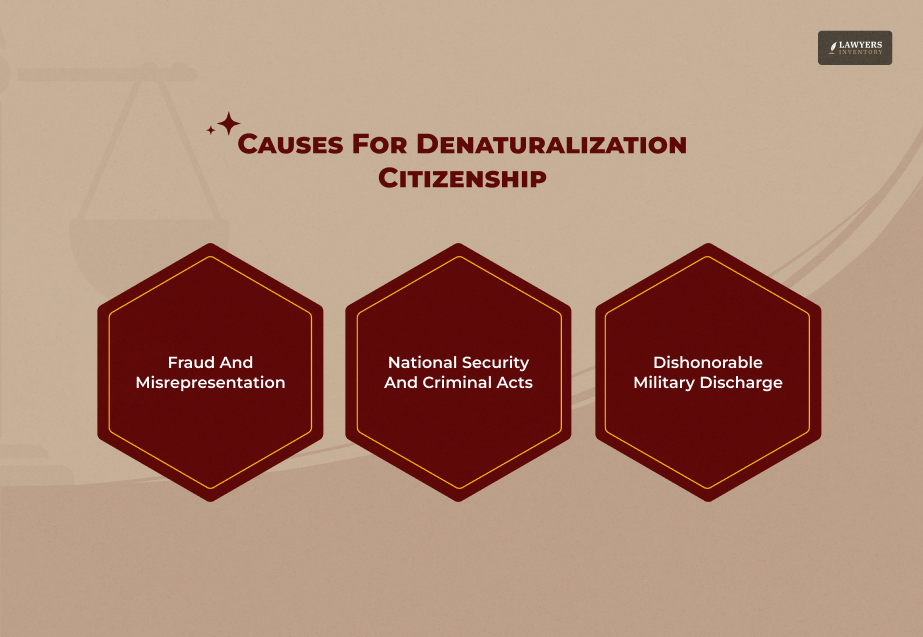
The grounds for denaturalization appear mostly in the past tense. It is a means for the government to establish that the citizen was never eligible for citizenship when he was naturalized.
1. Fraud / Misrepresentation Or Concealment Of Material Facts
This chapter of the USCIS Policy Manual talks about the most common recurring and most litigated basis for denaturalization citizenship. These are cases in which an individual procures naturalization by the following.
- Fraud,
- willful misrepresentation or
- concealment of a material fact.
In order to meet this legal obligation, the government needs to prove four things:
“1. The individual misrepresented or concealed some fact.
2. The misrepresentation or concealment was intentional (willful).
3. The fact misrepresented or concealed was material; and
4. The individual acquired citizenship because of the misrepresentation or concealment (causal relationship).”
2. Legal Standard Of Materiality In Denaturalization Proceedings
Above all, the fact has to be material. Time and again, the Supreme Court resolved, a fabricated or concealed fact is material if the true facts would actually lead to the refusal of naturalization.
Fedorenko v. United States, 449 U.S. 490 (1981)
In this ruling, according to the official court documents, the SC establishes that the inability to meet a statutory prerequisite of naturalization makes the citizenship “illegally procured.”
Here, the individual had suppressed his guard service in a concentration camp. The Court upheld the inability to meet the statutory prerequisite of being “lawfully admitted for permanent residence” due to ineligibility prior to admission (fraud). Thus, this was sufficient for the denaturalization of citizenship.
Kungys v. United States, 485 U.S. 759 (1988) (not 1987)
This is the controlling precedent that develops the “materiality” test for denaturalization on the ground of “willful misrepresentation.” The Court held that a misrepresentation is material if it has a “natural tendency to influence” the official decision. This, if the true facts had led to inquiry regarding the applicant’s fitness regarding character or residence, would be sufficient grounds for denaturalization citizenship.
3. Illegally Procuring Citizenship
Another core ground for denaturalization is the acquisition of citizenship through illicit means. In such a case, the person was naturalized after not meeting one of the statutory requirements for naturalization, such as:
- Failing to meet the minimum residence or physical presence requirement.
- Not having the requisite lawful admission for permanent residence (LPR) status.
- Failure to demonstrate good moral character during the required statutory period.
However, in such cases, there is an absence of fraudulent measures.
Let’s say that someone was naturalized, but years later, the government discovers that they were inadmissible at the time. Or, the authorities find out that the subject was missing an LPR status, which, according to USCIS, is a naturalization prerequisite.
In these cases, the government may claim the naturalization was illicit and then carry out a denaturalization of their citizenship.
4. Membership In Proscribed / Subversive Organizations
Statutory provisions also allow for the denaturalization of citizenship if the person falls under any of these categories.
- When they, within a certain period before the naturalization application, were a member of the Communist Party, another totalitarian party, or a terrorist organization. This is because such membership goes against the “attachment to the principles of the Constitution.”
- Lying about such membership in the naturalization application would constitute fraud.
5. Post-Naturalization Behavior
While naturalized citizenship is forfeitable depending on one’s post-naturalization conduct, such instances are generally rare and legally complex. The theory of denaturalization citizenship is typically retroactive.
The only important exception to the rule regarding post-naturalization conduct. It allows for loss of citizenship upon conviction of 18 U.S.C. § 1425 criminal fraud in attaining citizenship. For this, the underlying crime of fraud should have taken place during the filing of the application.
6. The Materiality Standard- Maslenjak v. United States (2017)
The landmark case of Maslenjak v. United States (2017) has laid down limits to the government’s application of 18 U.S.C. § 1425 for denaturalization citizenship. The Supreme Court ruled that lead to a conviction to lead, the false statement has to be “material”, with a “natural tendency to influence” the decision of citizenship.
7. New Frontiers- Financial Misrepresentation And Tax Fraud As A Basis For Denaturalization
In the last two years, the Department of Justice (DOJ) has directed the US government to proactively proceed with those cases in which individuals committed serious crimes before naturalization but had not disclosed them.
To be more precise, the DOJ prioritizes denaturalization amongst individuals who have engaged in fraud offenses. These instances may be of financial fraud against the United States or private parties.
When an individual commits a colossal tax evasion fraud, it disqualifies him from entering under the “good moral character” requirement for naturalization. Now, if at the time of naturalization, such an individual falsified their statement denying such act, his or her citizenship through denaturalization would be revoked.
What Are The Procedural Pathways & Standards?
The US denaturalization procedure is solely judicial and operates on either one of two independent channels: criminal or civil.
Civil Denaturalization (8 U.S.C. § 1451(a))
It is the more conventional path. The filing is made by the U.S. Attorney’s Office (USAO) in a U.S. District Court requesting a judicial order of revocation of the naturalization certificate. Thus, the government is a plaintiff in a civil action, and the defendant is the person naturalized.
Criminal Denaturalization (8 U.S.C. § 1451(e))
One faces conviction under 18 U.S.C. § 1425 for naturalization of citizenship or even attempting so by fraud. The Court wants proof of such a crime beyond a reasonable doubt. Once conviction is complete, denaturalization of citizenship takes place.
Government Must Prove Its Case- The Standard Of Proof In Denaturalization
The law also recognizes that revocation of an individual’s U.S. citizenship is an extremely severe action. As such, the government, when seeking to carry out denaturalization citizenship should bear the burden of proof for such action.
The standard needed varies quite distinctly depending on whether the case is a civil or criminal case.
In Civil Denaturalization Cases (The Most Typical Path)
The government must provide clear and convincing evidence for said denaturalization of citizenship. Moreover, the evidence must be strong enough to entertain no doubt that the person is never legally eligible for citizenship.
Most significantly, no statute of limitations in these cases allows the government to bring a civil action against a naturalized citizen whenever there is cause.
Here’s something that you should take a look at from NewYork University Law Review Issue Volume 94, Number 3 June 2019:
“Denaturalization is no longer so rare. Naturalized citizens’ sense of security has been fundamentally shaken by policy developments in the last five years.”
“It is pursuing denaturalization as a civil-litigation remedy and not just a criminal sanction—a choice that prosecutors find advantageous because civil proceedings come with a lower burden of proof, no guarantee of counsel to the defendant, and no statute of limitations.”
In Criminal Denaturalization Cases
The government must prove its case “beyond a reasonable doubt.” This is the highest legal standard, the exact same one used for finding a person guilty of committing any other crime.
Should the person be convicted of criminal naturalization fraud, the revocation of their denaturalization citizenship is automatic.
Unlike the civil action, there is a 10-year statute of limitations for the underlying criminal act.
The “clear, convincing, and unequivocal evidence” requirement of civil cases is due to the huge premium put on being a U.S. citizen.
“In February 2020, DOJ announced the creation of the Denaturalization Section within DOJ’s Office of Immigration Litigation, which was “dedicated to investigating and litigating revocation of naturalization”.
While this section was disbanded under the Biden administration, it has been effectively reconstituted under current enforcement priorities.”
Procedural Features Of The Denaturalization Process- Statute Of Limitations (Or Its Lack In Civil Cases)
The worst aspect of denaturalization citizenship is that there is no statute of limitations on civil denaturalization. The government can bring a civil revocation proceeding against a naturalized citizen whenever it wishes.
This may sometimes be decades later, after they have been naturalized. Thus, this absence of finality leaves the validity of their status perpetually under threat.
Rights Of The Accused
Any person who is the subject of a denaturalization proceeding has their right to due process. This includes their right to appear, present evidence, and the like. Most importantly, they may rebut the government’s charges in front of a federal magistrate.
Sixth Amendment Right To Counsel
In criminal denaturalization, the defendant has a full Sixth Amendment right to counsel. In civil actions, the lack of obligatory counsel for poor defendants remains an important criticism. However, judicial review is a check for such a system.
Immigration Status After Denaturalization
An effective order of denaturalization cancels the Certificate of Naturalization and brings the individual back to his former status. Thus, they then become a Lawful Permanent Resident (Green Card holder).
But since the cause of revocation is virtually always fraud or unlawful procurement, the individual is typically placed directly into removal or deportation proceedings.
What Are The Historical & Landmark Court Cases?
Supreme Court rulings have forever balanced state power against naturalized citizens’ constitutional rights.
Nishikawa v. Dulles (1958)
This case established that U.S. citizenship is a constitutional right one loses through their voluntary act of renunciation of said citizenship.
Costello v. INS (1964)
According to court documents, this is the ruling that formulated the “relation-back doctrine”. This establishes that citizenship is void ab initio (from the beginning). Thus, the government can cause it to go back to its prior status and even lead to deportation.
Precedent Revocation Cases
Denaturalization has been a recurring means of punishment in political groups (1930s Communists) and war criminals (former Nazis). These were the citizens who acquired citizenship fraudulently by keeping their pasts a secret.
What Are The Recent Trends & Policy Developments?
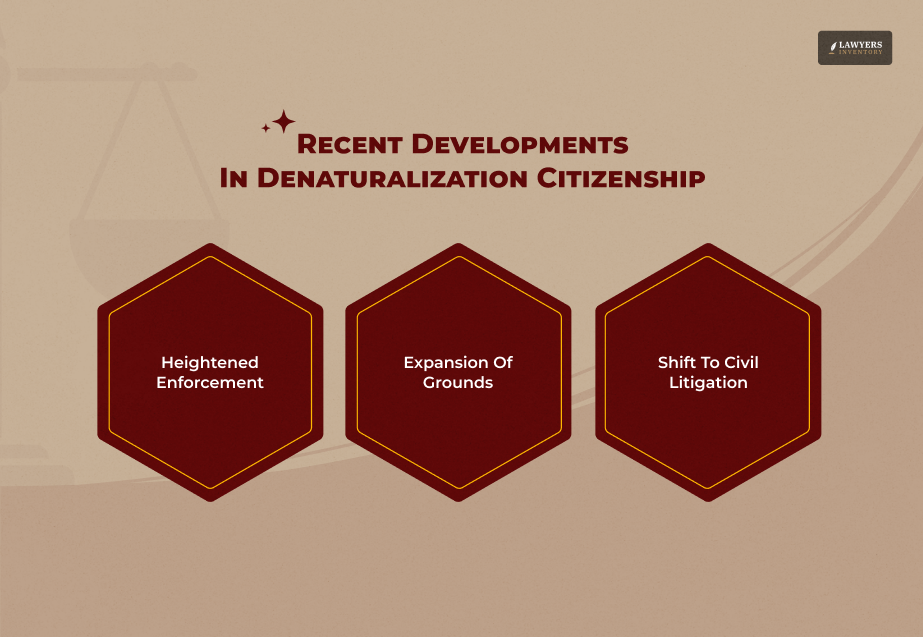
Denaturalization has taken enormous strides and consideration in recent years beyond the traditional.
Heightened U.S. Department Of Justice Prioritization To Prosecute Denaturalization Cases
The Obama administration also had a larger number of denaturalization cases. They also utilized advanced digital record-keeping to search for possible instances of fraud. However, the trend accelerated in scope under the Trump administration. Currently, denaturalization lies at the top of the immigration enforcement strategy of the US government.
The Department of Justice (DOJ) regularly releases memos that specify new categories of individuals for denaturalization. These memos protect US security against endangering practices or war crimes. However, some of the new focuses include the following.
- Ones who have involvement in cartel or gang interests.
- Someone who has been a part of human trafficking offenses.
- One who tried to obtain naturalization through fraud or through government corruption.
- Those who carried out economic fraud on the United States.
This heightened priority reflects a broader enforcement approach. Denaturalization of Citizenship is now a civil remedy against pre-naturalization wrongdoing.
Read Also: EB-5 Visa Lawyer: The BEST Immigration Lawyer for Investors?
Some Recent Cases
Now, let’s look at some contemporary cases of denaturalization of citizenship.
DoJ’s Denaturalization Of Child Sex Abuser
The case involving the Denaturalization of a child sex abuser by the Department of Justice shows a broader enforcement approach. Here, the Justice Department used denaturalization as a civil remedy against pre-naturalization. This led to the denaturalization of the citizenship of a convicted child sex abuse material distributor. He had hidden his criminality while going through the naturalization process.
Thus, the government holds that revoking citizenship serves the public interest by removing dangerous individuals as citizens.
Debate And Critiques
This increased drive toward denaturalization is leading to enormous political and legal outcry. Many hold that the growth of civil denaturalization risks crossing the line of authority and invading due process.
Due Process Concerns
Civil denaturalization requires a lesser standard of proof than criminal proceedings. Moreover, there is no statute of limitations. Thus, critics argue that it leads to the prosecution of long-time naturalized citizens for trivial or unintentional pre-naturalization defects.
Equality And Discriminatory Targeting
A danger is that the enlarged category will be used to target specific ethnic or political groups for discrimination.
Operation Janus And Other Efforts To Reconsider Previous Naturalizations
Operation Janus is a fascinating project on the part of the Department of Homeland Security (DHS).
This is to determine naturalized citizens who may have been awarded denaturalization citizenship by use of false identities or concealed past orders of deportation.
The procedure involved matching digitized prints against previous non-digitized records. This process has provided the evidence for numerous current denaturalization of citizenship proceedings. Moreover, it is able to reveal criminal histories or identity theft that would escape paper-recorded review years or even decades earlier.
Read Also: What Can A Green Card Holder Do If Detained?
What Are The International & Comparative Perspectives On Denaturalization Citizenship?
The United States’ denaturalization citizenship machinery is not alone. However, it fits within a system of emerging international human rights norms.
International Human Rights Norms
Another basic principle of international law is the proscription of statelessness.
The 1961 Convention on the Reduction of Statelessness says that States are not to render a person stateless if it leaves them stateless. The U.S. regime seeks to stand true to this principle. Therefore, it invokes the denaturalization of citizenship seriously only in the case of fraudulent practices.
Provisions Under Which Denaturalization Under International Law
International customary law and bodies like the European Convention on Nationality (ECN) generally permit deprivation of nationality in these cases.
- Nationality is obtained through fraud or false representation.
- The individual acts against the vital interests of the State.
What Are The Consequences & Impacts Of Denaturalization Citizenship?
The result of a successful denaturalization citizenship action is life-altering to the individual. It also has broader implications for the U.S. legal system and immigrant community.
For The Individual
The most severe and direct effect is the deprivation of the citizenship privilege of denaturalization. The individual loses all the rights and privileges of U.S. citizenship, including these.
- right to vote,
- travel on a U.S. passport,
- and working in the federal government.
They are immediately returned to the status they occupied prior to their naturalization.
After Denaturalization of citizenship in in order, deportation proceedings begin almost immediately. The individual can, however, fight their removal in immigration court without even the minimal protections of citizenship.
The act has a wide-ranging effect. Thus, certain rights still remain with the individual to prevent family disintegration as much as possible.
For Legal Regime
The process of denaturalization is a necessary measure to maintain public trust in the naturalization process. It protects the integrity of the naturalization process and punishes through denaturalization citizenship in cases of misrepresentation and fraud.
Many believe that denaturalization has a deterrent effect. Thus, it also compels all applicants for naturalization to reveal the entire truth in their application forms.
Risk Of Abuse, Chilling Effect On Immigrant Communities
Now that we have discussed all about the reasons and provisions of denaturalization, let’s delve a little deeper into the consequences of Denaturalization Citizenship.
Promoting Fear
Forceful efforts to strip individuals of citizenship inculcate a deep sense of fear in individuals. They feel that their status can go back to “illegal immigrant” many years later, even for an insignificant “clerical error”.
Chases Participation
The fear discourages eligible legal residents from seeking citizenship or participating in civic processes like voting or political organizing.
“Chilling Effect”
Immigrants are afraid that seeking naturalization or becoming active will lead to a government investigation into their past, stirring unnecessary trouble.
Legal And Policy Safeguards
The legal system has protections to prevent arbitrary loss of citizenship.
Judicial Review
Denaturalization happens through a federal court. Thus, many fear that the judge will deliver adverse rulings.
However, the government’s burden of solid and exceedingly high-level proof is a protection factor for all immigrants.
Monitoring, Resisting, Or Opposing Denaturalization Proceedings
Defense against denaturalization of citizenship is a serious, complex, and risky legal fight requiring experienced lawyers.
Immigrant Legal Advocacy Organizations’ Role
Pro bono lawyers and immigration advocacy groups play a crucial role because they provide specialized legal services to naturalized citizens.
Preserving The Right To Fairness
They provide due process, screen the evidence introduced by the government, and make the argument in federal court, which is necessary due to the complexity of the evidence required.
What Are The Potential Defenses Against Denaturalization Citizenship?
Legal methods generally used in defending a case of denaturalization may include the following.
Lack Of Materiality/Causation
Immigration lawyers usually claim that the secret fact was insufficient to influence the decision. The ruling in the Maslenjak case helps them argue that a fair-minded official would not deny citizenship that may trigger their disqualification if they knew the fact.
Challenging The Evidence
An immigration attorney may argue that the government did not provide the extremely high burden of proof (which should be “clear, convincing, and unequivocal” evidence).
Due Process Violations
One’s lawyer may argue that the government investigation, charging process, or judicial proceedings infringe on the citizen’s constitutional rights.
Overcoming Willfulness
An immigration attorney may also argue that the error was not a knowing misrepresentation or willful fraud. Rather, it could be an honest mistake, an accident, or a product of incompetent counsel.
Top Denaturalization Citizenship Issues (2025 Focus)
Now, we’re going to answer some of the most frequently asked questions about Denaturalization. Hope this helps!
Ans- Generally not. Despite the Department of Justice making denaturalization a top priority, you’ll need to commit conscious fraud for a loss of citizenship. A careless clerical error will not lead to the denial of your application.
Ans- If your citizenship is revoked, deportation will follow. Furthermore, children deriving their U.S. citizenship from you will also face revocation. Try getting in touch with a good immigration lawyer to show you the best way out.
Ans- Unfortunately, no. For civil actions denaturalizing a person, there is no statute of limitations. Current 2025 enforcement also holds that how long you have been a citizen does not safeguard against the denaturalization process.
Hope the article helps!
References / Bibliography:
Statutes (U.S. Code)
- 8 U.S.C. § 1451 (Revocation of naturalization)
- 18 U.S.C. § 1425 (Procurement of citizenship or naturalization unlawfully)
Court Opinions and Case Law Sources
- Schneiderman v. United States, 320 U.S. 118 (1943)
- Nishikawa v. Dulles, 356 U.S. 129 (1958)
- Costello v. INS, 376 U.S. 120 (1964)
- Maslenjak v. United States, 582 U.S. (2017)
Government and DOJ Policy
- Sheets on Denaturalization
NGO / Advocacy Reports
- Immigrant Legal Resource Center (ILRC) FAQs on Denaturalization
News Coverage Memos
- Department of Justice Policy Memos on Priorities for Denaturalization Cases (various dates)
Legal Scholarship and Articles
- Robertson, Cassandra Burke and Manta, Irina D. “(Un)Civil Denaturalization” (discussing due process and the lack of a statute of limitations in civil cases)
National Immigration Forum Fact
- The Washington Post, NBC News, and other major outlets reporting on DOJ initiatives and policy shifts in the pursuit of denaturalization actions.






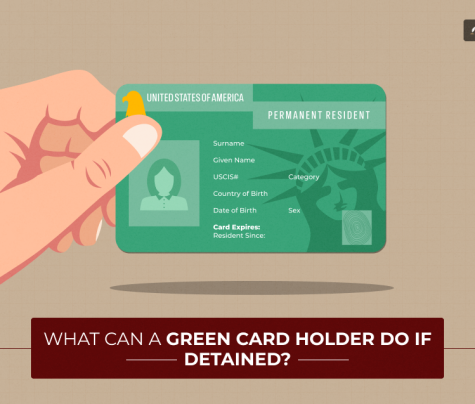

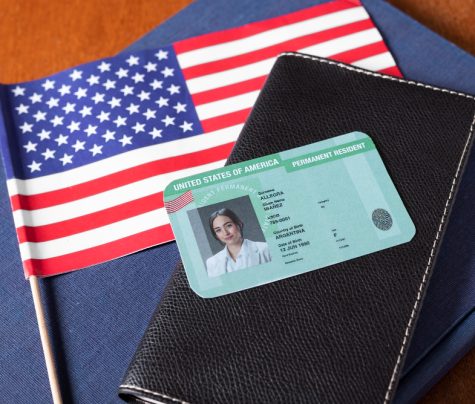



0 Reply
No comments yet.